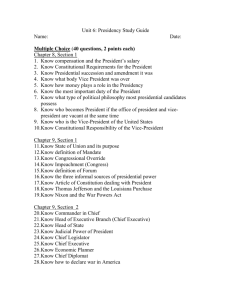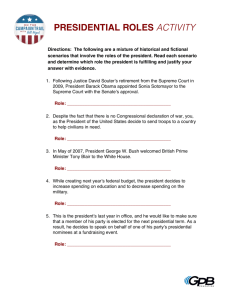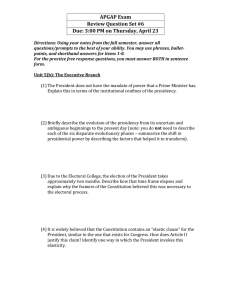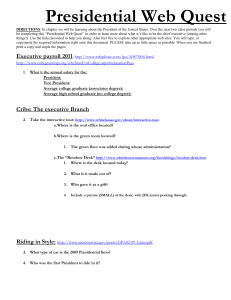Opening Statement of Rep. Wm. Lacy Clay (D-MO), Chairman
advertisement
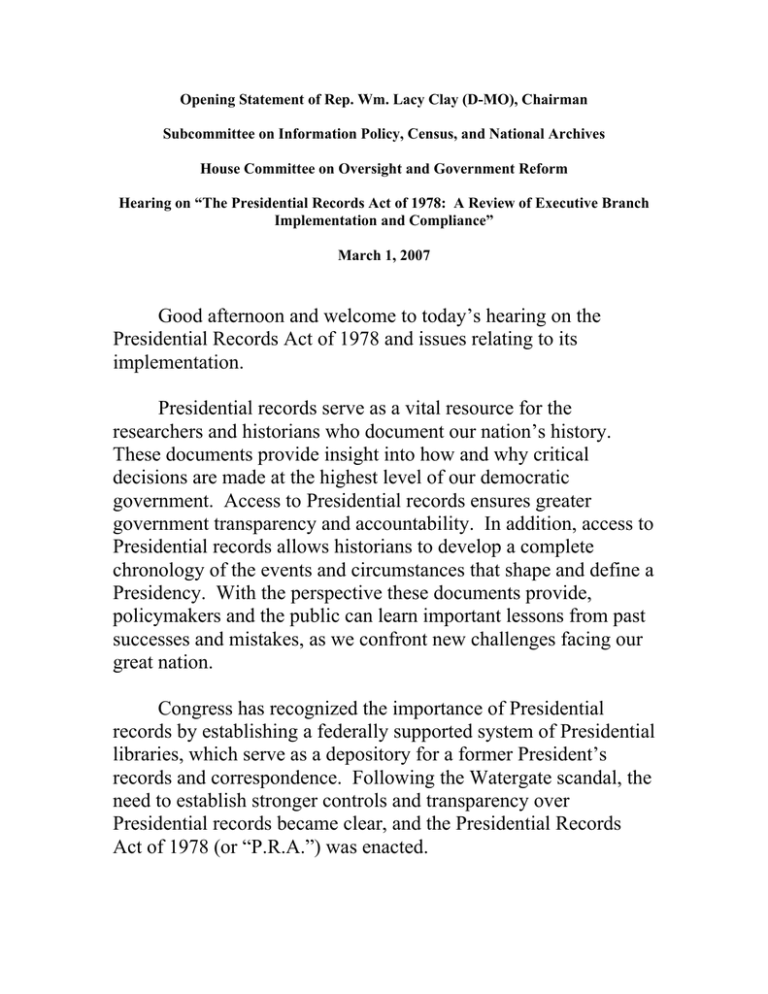
Opening Statement of Rep. Wm. Lacy Clay (D-MO), Chairman Subcommittee on Information Policy, Census, and National Archives House Committee on Oversight and Government Reform Hearing on “The Presidential Records Act of 1978: A Review of Executive Branch Implementation and Compliance” March 1, 2007 Good afternoon and welcome to today’s hearing on the Presidential Records Act of 1978 and issues relating to its implementation. Presidential records serve as a vital resource for the researchers and historians who document our nation’s history. These documents provide insight into how and why critical decisions are made at the highest level of our democratic government. Access to Presidential records ensures greater government transparency and accountability. In addition, access to Presidential records allows historians to develop a complete chronology of the events and circumstances that shape and define a Presidency. With the perspective these documents provide, policymakers and the public can learn important lessons from past successes and mistakes, as we confront new challenges facing our great nation. Congress has recognized the importance of Presidential records by establishing a federally supported system of Presidential libraries, which serve as a depository for a former President’s records and correspondence. Following the Watergate scandal, the need to establish stronger controls and transparency over Presidential records became clear, and the Presidential Records Act of 1978 (or “P.R.A.”) was enacted. The P.R.A. gave definition to the term “Presidential records,” and officially made these records federal property once the incumbent President leaves office. The Act also established appropriate protections to ensure that sensitive or classified information would not be released to the public. In 2001, President Bush issued Executive Order 13233, which established new restrictions on access to Presidential records. Specifically, the Order granted former Presidents, and their appointees, veto authority over the release of records containing confidential advice and deliberations among advisors. Such restrictions provide former Presidents indefinite control over many records that address important strategic and planning decisions. As such, they directly undermine the purpose of disclosure that animates the P.R.A. Many view the Bush Executive Order as a broad grab at executive power – an attempt to make the public disclosure of future Presidential decision-making activities purely voluntary. The impact of these restrictions could very well be to prevent us from learning many significant facts and circumstances surrounding key Administration policy decisions. I am proud to say that I am an original cosponsor of legislation, introduced today by full Committee Chairman Henry Waxman, that would rescind Executive Order 13233. I’m happy that Chairman Waxman is participating with us today as ex officio member of the Subcommittee and I thank him for his leadership on this important issue. H.R. 1255, the Presidential Records Act Amendment of 2007, has bipartisan support, with Representatives John Duncan and Todd Platts joining me as original cosponsors. I look forward to working with my colleagues on both sides of the aisle to move this legislation forward in the coming weeks; and I sincerely hope that we’ll have a meaningful and constructive dialogue with the Bush Administration along the way. 2 I believe that today’s hearing will make it clear that rescinding Executive Order 13233 is clearly in the public interest. To help us understand the history and function of the Presidential Records Act and what is at stake, we have two highly distinguished panels representing both government and the private sector. Appearing on our first panel will be the Archivist of the United States, Dr. Allen Weinstein (WINE-stine), and Dr. Harold Relyea (“Rel-YAY”), a Specialist in American National Government with the Congressional Research Service of the Library of Congress. Our second panel consists of Dr. Robert Dallek, noted Presidential biographer and historian; Mr. Thomas Blanton, Director of the National Security Archive at George Washington University; Dr. Anna Nelson, Distinguished Historian in Residence at The American University; Mr. Scott Nelson, Senior Attorney at the Public Citizen Litigation Group; and Mr. Steven Hensen, representing the Society of American Archivists. I thank all of the witnesses for appearing today and look forward to their testimony. ## 3
